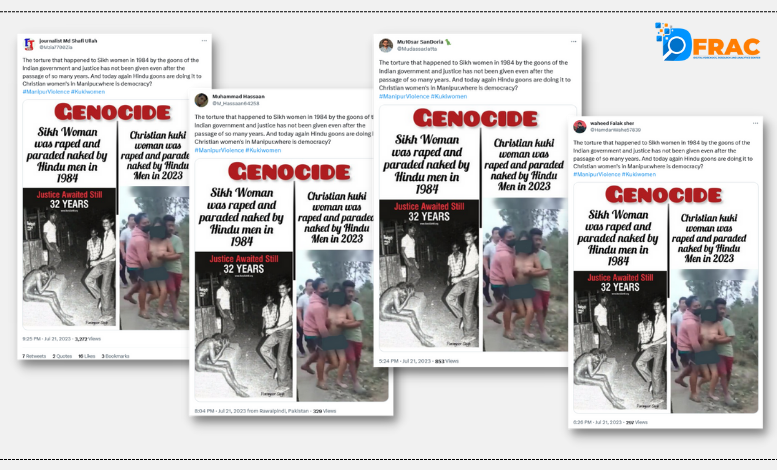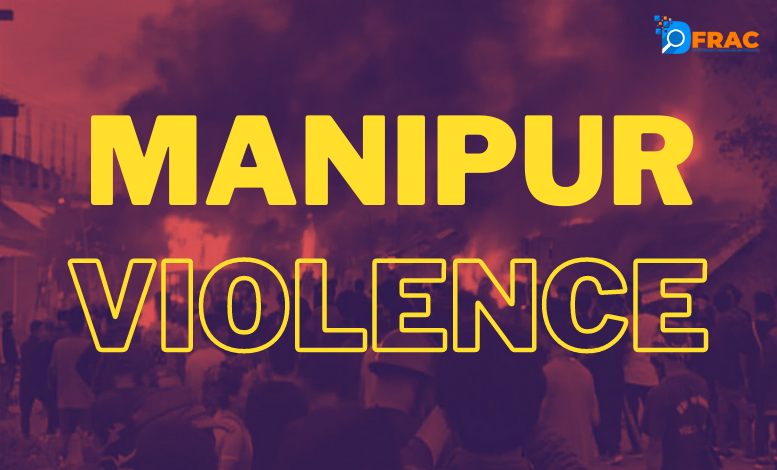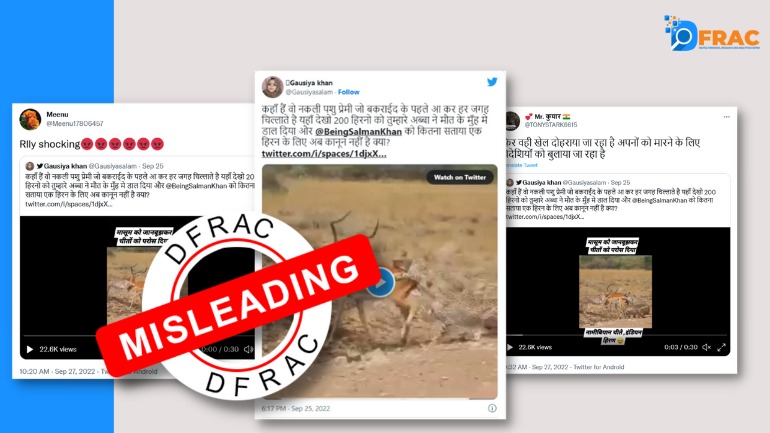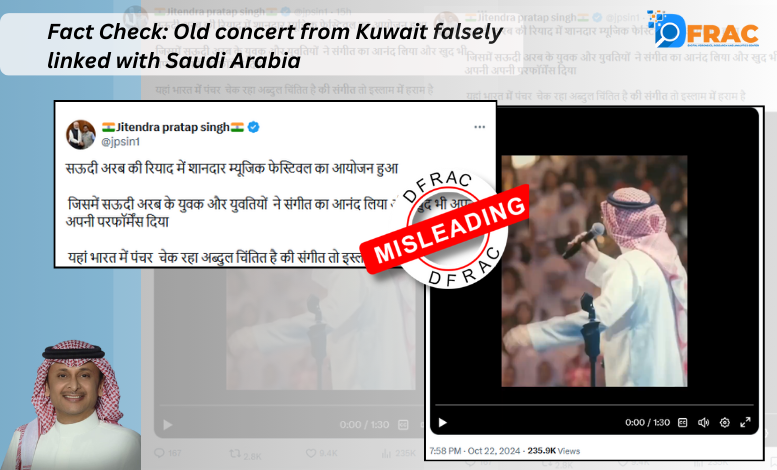No its not about Christians vs Hindus or Hill vs Valley – they have lived peacefully together for ages
Manipur has been witnessing massive violence so far. More than 150 people have been reported dead in this violence, while thousands have been evacuated. It falls under the category of severe human tragedy. Manipur has witnessed several horrifying incidents during this violence which are a disgrace to humanity. Serious allegations are being made against the state government. Amidst all this, Numerous issues are addressed regarding the causes of the widespread violence in Manipur. This reports provides a complete overview of the incident in Manipur. In this DFRAC report, we shed highlight on the following points:
- Overview of Manipur Crisis
- Historical Struggle background of Kuki and Meitei
- Violence & War on Drugs
- Investigation of Fake and Misleading News
- “Anti-India” disinformation campaign
- An attempt to link the ongoing ethnic struggle with religion
When this controversy began?
There has been an ongoing demand to include the Meitei community in the Scheduled Tribe category. The Meitei Association had filed a petition in the Manipur High Court.The petition stated that prior to India’s merger in 1949, the Meitei community had been recognized as a Scheduled Tribe, but this recognition was withdrawn later. They argued that it is important to grant tribal status to the Meitei community in order to preserve their ancestors’ land, traditions, culture, and language. On April 14, 2023, the Manipur High Court delivered its verdict on this matter, directing the state government to submit its response within four weeks.
The recent decision of the High Court has heated up Manipur’s atmosphere. The Naga and Kuki tribes have started opposing it. According to Tribal groups in Manipur, Meitei community holds significant economic and political dominance. They believe that if Meiteis are granted tribal status, it will result in the reduction of job opportunities for them. Additionally, they worry that Meiteis will start purchasing land in the hills, pushing the other tribal groups to the margins. Not only this, but these tribal groups also mention that the language of the Meitei community is included in the 8th Schedule of the Constitution, and they also receive benefits under the Scheduled Tribes, Backward Classes, and Economically Weaker Sections (EWS) categories. Amidst these controversies, on May 3rd, the All Tribal Students’ Union Manipur organized a rally called the “Tribal Unity Rally” in Churachandpur, approximately 65 kilometers away from Imphal. Thousands of people participated in this rally. However, clashes broke out between tribal and other groups during the event. Consequently, this violence spread to other areas as well.
Opium cultivation behind Manipur violence?
Opium cultivation has been a significant issue in Manipur for many years. Several media reports have also mentioned opium cultivation is related to the violence in Manipur. These media reports suggest that the state government has been taking strict action against opium cultivation, which is mainly associated with the Kuki community.
According to a report from the BBC,” the underlying tensions in Manipur stem from a complex interplay of various factors, one of which is a recent crackdown on drugs in recent years. The Bharatiya Janta Party (BJP)-led state government, under Chief Minister N Biren Singh who is a Meitei, launched a controversial campaign targeting poppy farming. Since 2017, his government claims to have destroyed more than 18,600 acres of poppy farms, the majority of them in Kuki-inhabited areas. (Manipur has long battled a drug-addiction crisis and is among four north-eastern Indian states bordering Myanmar, The world’s second-largest opium producer).

In addition to that, several media reports have cited opium cultivation as major reason behind violence in Manipur.

Fake and Misleading News over Manipur Violence
Social media is also being used to spread a variety of false and misleading information about the violence in Manipur. The DFRAC team has fact-checked this fake news. Here are some fact-checks-
Fact-Check 1
A video is shared on Social media, claiming that a separate team of naked women has formed to protest against the police in Manipur.
Viral video is not associated with Manipur. In fact, this video was taken during the civic elections in Uttar Pradesh, when supporters of independent candidate Sonu Kinnar created a ruckus alleging rigging in the municipal council elections in Chandauli district. The fact check can be read by clicking on the link below.
Fact-Check 2
Users on Social media are claiming that the 300-year-old has been turned into ashes. When the video was fact-checked, it was discovered that it wasn’t shot in Manipur but rather during the unrest in France.
Fact-Check 3
A video is getting viral on social media, showing a woman being assaulted. Users claim that this Christian woman was murdered for shouting ‘Out Modi’. A user wrote: “Warning, The world needs to know about Hindu terror. Whilst #modi travels the world and is worshiped by the Hindu despora. Back in India. Muslims, Sikhs and Christians are being systematically killed by the state. This poor Christian was murdered for simply calling out modi!”

Fact
The incident shown in the viral video is dated February 2022 and is from Myanmar, not India. That is why the assertion made by users of social media is misleading.

‘Anti-India disinformation Campaign’
Pakistani users have tweeted extensively, giving a religious angle to the Manipur incident. These users have portrayed Manipur’s ethnic struggle as a persecution of Christians (Kuki-Naga) by Hindus (Meiteis) and have spread this narrative as a form of Hindu atrocities. However, several media reports have already revealed that this is not a religious violence but a struggle for land and rights. Pakistani users have cleverly linked the Manipur violence with the Sikh opposition riots of 1984. They have even shared a collage of two photos to support their claim. You can see the collage here.

Collage’s Fact-check
One of the most interesting things here is that the photo being circulated in Pakistan’s viral collage, claiming to depict the 1984 Sikh genocide, is actually not from India at all. This photo is from the violence against Tamil-speakers that occurred in Sri Lanka in 1983, which is also known as the civil war. It is also referred to as “Black July.”

Here is a collage of fake photos posted by Pakistani users-

Manipur search trend on Google in Pakistan:
“Manipur Violence” is a Google Trend that shows the popularity of this keyword in Pakistan. It started on July 18th and was searched the most. Additionally, Manipur was searched in Pakistan on other days as well, as seen in the graph provided below.

Apart from this, Islamabad had the highest searches for Manipur in Pakistan. Following that, Sindh, Punjab, and Khyber Pakhtunkhwa had the highest number of searches

The Manipur violence has been the most searched topic in India. Following that, significant numbers of searches on the same keyword were made from the United Arab Emirates, Qatar, Kuwait, and Singapore as well.

On the other hand, tweets of some Pakistani users running anti-India campaign are being given here-
- A user named Mudassar (@MudassarJatta) from Pakistan wrote: ” The torture that happened to Sikh women in 1984 by the goons of the Indian government and justice has not been given even after the passage of so many years. And today again Hindu goons are doing it to Christian women’s in Manipur.where is democracy?”

- A user named Proud Pakistani (@S_kamikhan) wrote on Twitter: ” Christian women parraded by Hindus in #manipur , that’s extremely shameful and disgusting.

- A user named Inaya Ajaz (@InayaAjaz), a resident of Lahore, Pakistan, wrote: ” The torture that happened to Sikh women in 1984 by the goons of the Indian government and justice has not been given even after the passage of so many years. And today again Hindu goons are doing it to Christian women’s in Manipur.where is democracy?”

- A user named M Sufyan Basra (@msufyanbasra), an employee of the School Education Department of Pakistan’s Punjab province, wrote: ” The atrocities inflicted upon Sikh women in 1984 by Hindu goons, along with the absence of justice for so many years, remain deeply concerning. Sadly, even today, similar acts are being perpetrated against Christian women in Manipur by Hindu goons”.

An attempt to link Manipur violence with religion:
Users on social media have shared posts about the ethnic violence in Manipur, labeling it as a religious angle. They are attempting to depict the violence as being motivated by religious intolerance or hatred, by mentioning the religious identity of the victims as Christian women. The Indian American Muslim Council (IAMC) has shared this incident, highlighting its religious aspect.

- Ashok Swain has shared a post regarding Manipur. His tweet refers to the situation in Manipur, using a communal tone. In this tweet, he reveals the long-standing violence, the high number of casualties (mostly attributed to the Christian community), multiple church burnings, and the displacement of a significant number of people belonging to a particular religious group. Additionally, the tweet mentions the objectification and sexual harassment of Naga women by the Kuki community.

- The tweet by a user named Abu Hafsa gives a communal angle to the Manipur incident by portraying it as two sides Kuki (Christian) and Meitei (Hindu).

- The tweet by the South Asia Index reflects a communal angle behind the Manipur violence. It seems to reveals the religious tension prevalent in the region. The tweet highlights the ethnic conflict as a struggle between two religious communities – Christians and Hindus. Additionally, the tweet also attempts to showcase the state government’s support for the Meitei community.

- Abdullah Alamadi’s tweet clearly highlights on the communal sentiment focused on Manipur and the negative portrayal of Hindus. It magnifies the communal angle and strengthens the negative image of Hindus. It compares the story of Bilquis Bano, a case of communal violence, which strengthens the religious angle even more. Finally, the mention of the “minority threat” emphasizes the danger faced by minority communities. Overall, the paragraph includes elements that incite religious and communal sentiments.

In a reported incident mentioned by The Washington Post, a possible communal angle has been highlighted. The report describes the depiction of ethnic violence in Manipur, which initially started with a dispute involving Christian Kukis and predominantly Hindu Meitei individuals. The report suggests that the conflict has taken on a communal dimension, as it involves various ethnic groups (Christian Kukis and Hindu Meiteis) related to land rights and government jobs.
The violence and clashes resulted in the death of over 130 people and the formation of armed militias by warring factions. The victims of the attack mentioned in the video have been identified as members of the Kuki-Zomi community, an indigenous organization in Manipur. The fact that the violence is happening on a basis of ethnicity suggests the communal aspect of the conflict.

The same incident has been underlined in an article by Al Jazeera (@AJEnglish) with clear sectarian tones. This incident has been described as a deadly communal riot between the Hindu Meitei and Christian Kuki-Zomi tribes.

According to a report from Aaj Tak, Violence in Manipur is being characterized as a “battle for control.” This is justified by the claim that only 10% of the Meitei group, which represents around 55% of the state’s population, can reside in the Plain areas. Meanwhile, the Kuki and Naga communities, accounting for 40% of the population, are predominantly located in the hilly areas, which constitute 90% of the state. As per Manipur’s laws, only tribals can settle in the hilly regions. However, the Meiteis, being non-tribals, are unable to settle in these areas.

A report by BBC has also revealed that the dispute is associated with land rights. According to the report, ” This is the reason for the dispute, because the Meitei people cannot buy land in the Kuki areas and now they also want the status of a tribe. Obviously, the dispute is associated with the issue of rights on the land. The majority of the population of 2.8 million have lived in the Meitei Valley, while the Kuki population is settled in four hill districts”.

Moreover, several media reports have listed the causes of the violence alongside issues such as tribal status and land rights.
Conclusion
Land rights and tribal status are the main causes of the violence in Manipur. There is no religious conflict involved in this violence, as mentioned in any media reports. Moreover, there is no indication of any religious motivations for the violence.
However, there are various fake and misleading news circulating on social media regarding Manipur. Additionally, Pakistan and Western media are referring to this incident as a dispute between the Christian and Hindu communities. Pakistani users are also trying to use this incident to underline anti-Sikh violence in India, creating an atmosphere that suggests that minorities are not safe in India.





